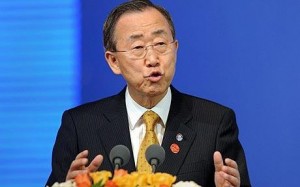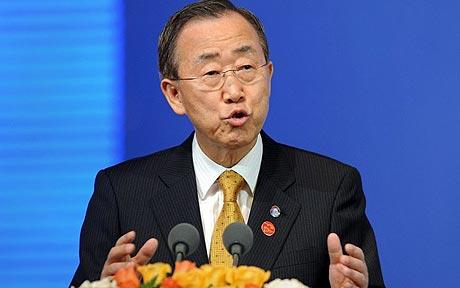
(AFP Photo)
United Nations Secretary General Ban Ki-moon announced late Tuesday that Palestine will be accepted into the International Criminal Court (ICC), allowing the Palestinians to pursue war-crimes charges against Israel.
A statement on the UN Treaties website confirms Palestine’s accession to the Rome Statute that underpins the ICC, noting it “will enter into force for the State of Palestine on 1 April 2015”.
The approval follows the ratification of the Rome Statue by Palestinian Authority President Mahmoud Abbas on 2 January indicating they formally acknowledge the court’s jurisdiction.
The documentation was signed a day after the UN Security Council rejected a resolution to recognise Palestine as a nation. It did, however, set a three-year deadline for the establishment of a state on lands occupied by Israel.
Underneath the announcement of Palestine’s ratification of the statue, the ICC stated that it is “an independent, permanent court that tries individuals accused of the most serious crimes of concern to the international community as a whole, namely the crime of genocide, crimes against humanity and war crimes”.
Palestinian Ambassador Riyad Mansour said the Palestinians are seeking to bring to the court war-crimes committed by Israel. These include last summer’s 50-day war in Gaza and the building of illegal Israeli settlements on Palestinian territory.
However, the UN statement continued that “acceptance of the ICC’s jurisdiction does not automatically trigger an investigation. It is for the ICC Prosecutor to establish whether the Rome Statute criteria for opening an investigation are met and, where required, to request authorisation from ICC Judges.”
Israel’s has taken a strongly negative view of the Palestinian efforts to join UN bodies and treaties.
Following Palestine’s application to the ICC, Israel froze the transfer of Palestinian tax funds amounting to 500m Israeli New Shekel ($127.6m) collected by Israel on behalf of the Palestinians. Israeli Prime Minister spokesperson Ofir Gendelman stressed Israel’s “disappointment”, and referred to the move as a “flagrant violation of agreements signed by PA with Israel”.
It is also expected that Israel will ask the United States to cut its $400m aid to Palestine in response. US State Department spokesperson Jen Psaki has confirmed this is a possibility and is mandated for in the stipulations of a funding bill signed off by US President Barack Obama last month. This would occur should “the Palestinians initiate an International Criminal Court judicially authorised investigation, or actively support such an investigation, that subjects Israeli nationals to an investigation for alleged crimes against Palestinians”.
A source at the Palestinian Embassy in Cairo told Daily News Egypt that further responses from the Israeli side are expected to take an “illegal” form.
“Legally Israel cannot challenge Palestine joining the ICC. We haven’t done anything wrong,” the source said. “However, we’re expecting that further responses could take the form of expanded illegal settlements, detentions, or other illegal abuses of power.”
Commenting on the halted tax funds, the source said: “It is our money, Israel just collects it for us.”
The source also said: “Currently Israel is accusing Abbas of crimes that Hamas has committed when in reality the Palestinian transgressions in the peace process have not come from the Palestinian Authority”.
The source also stated that all major Palestinian factions, including Hamas, agreed to the move.
Palestinian Chief Negotiator Saeb Erekat recently told Daily News Egypt: “It’s our right to join the ICC. We are a state under occupation and it’s our right to internationalise the issue and defend our people.”
“If Israel worries about Palestine joining the ICC, it should stop committing crimes”, adding that “they stand no chance,” Erekat continued. “Israel left no room for negotiations.”
No official was available for further comment at the Israeli foreign ministry and as of yet no direct statement has been made following the ICC announcement.
Palestine will become the 123rd member of the International Criminal Court, established in 2002. The Court has often been criticised as whilst it has the ability to issue indictments and arrest warrants for individuals accused of war crimes, it has no enforcement power to bring those in question to face trial at its headquarters, The Hague.


